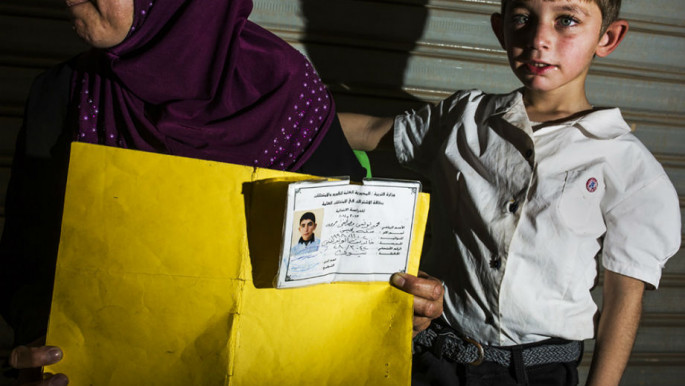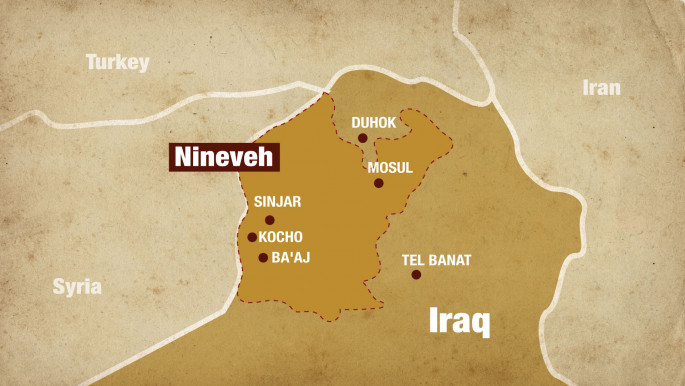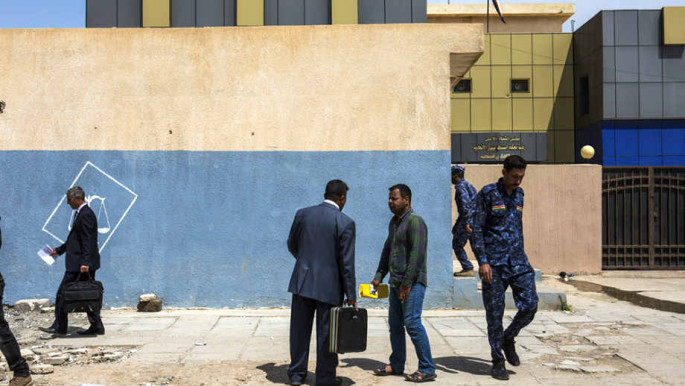Innocent Iraqi boys swept up in hunt for Islamic State's child soldiers
Exclusive: Hundreds of teenage boys have been rounded up by Iraqi troops in Mosul, where they now face military trials, accused of being Islamic State group fighters, reports Marta Bellingreri.
6 min read
Saher, 14, was forced to join IS by his militant uncle [Alessio Mamo]
In her right hand, Sakne holds the identity card belonging to her 16-year-old son, Mohammed. Her left hand tightens its grip on the wiry arm of her younger son, Abbas.
On her face is a look of exhaustion - combined with a fierce determination.
"I will come here every week until I don't see Mohammed here again," she tells The New Arab.
She is standing in front of the special court set up to deal with Mosul's terrorism-related cases in Hamdaniyya, 30km south-east of Mosul. Around her, victims and accused from the self-proclaimed "Caliphate" are waiting their turn to be seen by the judges.
Mohammed was arrested in February by the Iraqi army as a suspected Islamic State group fighter. But Sakne insists her boy is just an innocent teenager caught up by mistake.
"I am one of the victims of the three years of IS in Mosul, but now I am here to seek justice for an unjust arrest committed by the Iraqi state," the 43-year-old mother told The New Arab.
"We were at home during the furious battle in our neighbourhood - Hayy Ennour - when some men from the Iraqi army took my son away from the house and brought him to the mosque nearby, together with other young men. They said they were going to perform the prayer together. But then, they were all arrested as suspected members of Daesh, the so-called Islamic State."
She suspects they took the boys to the mosque in order to accuse them of being "faithful followers" of the armed group's doctrine. During the fighting, few people were still attending prayers at Mosul's mosques.
Sakne says her son is too young to be tried in an adult court, and that she has a right to see him - or at least receive news of his condition.
She hasn't heard from him since February 6.
Soon after his arrest, she took Abbas and other family members and left her family home amid the raging battle. She now lives in the Hassan Sham camp for the displaced, from where it is even more difficult to be in contact with her friends - the mothers of the other boys swept up in the hunt for IS child soldiers.
Mohammed went to school until the deteriorating economic conditions under IS led him to leave the classroom - where the militant group had rewritten the curriculum - and take up paid employment. He started work aged 15 as a labourer.
"I completed the file and presented to the court," said Sakne. "I am seeking justice, but I am also worried about my son's precarious health."
Mohammed has Hepatitis B, his mother says, and was weak in the days before he disappeared into the clutches of the military legal system. "I am not sure that he is being treated well or if he is sleeping in good conditions," said Sakne.
Her worries are not unfounded. A majority of the thousands of men arrested during the ten-month battle in Mosul and its surroundings are being held inhumanely in prisons, police stations and makeshifts detention centres all around Mosul - if, that is, they have not already been executed.
Two police officers invited The New Arab to visit the makeshift cells at the local Intelligence Department in Hamdaniyya.
"Many of these prisoners have been held here for months without any trial. All of them have scabies and there are some children among them," reported one officer on condition of anonymity.
"We are afraid the people will die here. We bought the air-conditioning with our own money, because there are forty or more people inside each cell and the temperature inside is up to 40C."
Sakne's son could be one of these captives, but nobody can verify their identities. "We believe most of them are terrorists," said the officer. "But there are also some innocents or simply young men. Too many adolescents."
A few kilometres away in the same town, Saher, a thin and shy adolescent, has been interrogated as a witness in a trial of suspected IS fighters.
Saher was born in 2003, when the US-led invasion started and Saddam Hussein's regime collapsed. His father died in 2011 in an explosion in their hometown, Nimrud. The boy's uncle forced him to join IS militants a year and a half ago.
Saher is now in prison; his uncle was fighting in West Mosul until last May.
"I was a cook for Daesh, I was cooking eggs, meat -everything," he told The New Arab as a judge looked on. The judge gave him a look, and the story changed: "I was trained for a week by the IS militants and I learned how to use weapons."
His mother and his friends disapproved of his journey to Mosul with the uncle, but they could not intervene to stop the family elder.
The boy, now 14, kept in touch with his mother until he was imprisoned. He now cannot contact anyone, including his mother and uncle.
"I am a supporter of Real Madrid football team. We used to watch the football matches together with the other militants in the night," he confessed spontaneously, sketching a smile for the first time and raising his head.
The inhabitants of Mosul were forbidden to watch TV during the three years of IS rule. The smile quickly disappears from his face.
Ivan K is an Iraqi lawyer at the "terrorism court" in Mosul.
"Saher, as well as other adolescents accused of being IS members are held in prisons together with adults," he said.
"This is against the law. They should go in detention centres specific for minors." Some 205 children accused of IS affiliation are being held in one such specifically designated detention centre for minors in Erbil, the capital of the Kurdish autonomous region.
"The conditions would be a bit better for them and also they could get easier access to their rights - such as being able to speak with their families," the lawyer told The New Arab.
Sakne's wish of seeing her son again is still far from realised. In the aftermath of the nine-month battle to retake Mosul, and with an ongoing conflict in the country to reconquer all territories from IS, legal provisions are often neglected and basic rights are often ignored.
And the most vulnerable, like Mohammed and Saher, remain languishing in Iraq's crowded dungeons, where the rights afforded to them under international law are simply forgotten.
Marta Bellingreri is a freelance researcher and writer. Follow her on Twitter: @MartaDafne
On her face is a look of exhaustion - combined with a fierce determination.
"I will come here every week until I don't see Mohammed here again," she tells The New Arab.
She is standing in front of the special court set up to deal with Mosul's terrorism-related cases in Hamdaniyya, 30km south-east of Mosul. Around her, victims and accused from the self-proclaimed "Caliphate" are waiting their turn to be seen by the judges.
Mohammed was arrested in February by the Iraqi army as a suspected Islamic State group fighter. But Sakne insists her boy is just an innocent teenager caught up by mistake.
"I am one of the victims of the three years of IS in Mosul, but now I am here to seek justice for an unjust arrest committed by the Iraqi state," the 43-year-old mother told The New Arab.
"We were at home during the furious battle in our neighbourhood - Hayy Ennour - when some men from the Iraqi army took my son away from the house and brought him to the mosque nearby, together with other young men. They said they were going to perform the prayer together. But then, they were all arrested as suspected members of Daesh, the so-called Islamic State."
 |
| Sakne and her younger son, Abbas, are fighting to see 16-year-old Mohammed, who was snatched by Iraqi soldiers in February [Alessio Mamo] |
She suspects they took the boys to the mosque in order to accuse them of being "faithful followers" of the armed group's doctrine. During the fighting, few people were still attending prayers at Mosul's mosques.
Sakne says her son is too young to be tried in an adult court, and that she has a right to see him - or at least receive news of his condition.
She hasn't heard from him since February 6.
Soon after his arrest, she took Abbas and other family members and left her family home amid the raging battle. She now lives in the Hassan Sham camp for the displaced, from where it is even more difficult to be in contact with her friends - the mothers of the other boys swept up in the hunt for IS child soldiers.
 |
We believe most of them are terrorists... But there are also some innocents or simply young men. Too many adolescents - Jail guard |
 |
Mohammed went to school until the deteriorating economic conditions under IS led him to leave the classroom - where the militant group had rewritten the curriculum - and take up paid employment. He started work aged 15 as a labourer.
"I completed the file and presented to the court," said Sakne. "I am seeking justice, but I am also worried about my son's precarious health."
Mohammed has Hepatitis B, his mother says, and was weak in the days before he disappeared into the clutches of the military legal system. "I am not sure that he is being treated well or if he is sleeping in good conditions," said Sakne.
 |
|
| [Click to enlarge] |
Her worries are not unfounded. A majority of the thousands of men arrested during the ten-month battle in Mosul and its surroundings are being held inhumanely in prisons, police stations and makeshifts detention centres all around Mosul - if, that is, they have not already been executed.
Two police officers invited The New Arab to visit the makeshift cells at the local Intelligence Department in Hamdaniyya.
"Many of these prisoners have been held here for months without any trial. All of them have scabies and there are some children among them," reported one officer on condition of anonymity.
"We are afraid the people will die here. We bought the air-conditioning with our own money, because there are forty or more people inside each cell and the temperature inside is up to 40C."
Sakne's son could be one of these captives, but nobody can verify their identities. "We believe most of them are terrorists," said the officer. "But there are also some innocents or simply young men. Too many adolescents."
A few kilometres away in the same town, Saher, a thin and shy adolescent, has been interrogated as a witness in a trial of suspected IS fighters.
Saher was born in 2003, when the US-led invasion started and Saddam Hussein's regime collapsed. His father died in 2011 in an explosion in their hometown, Nimrud. The boy's uncle forced him to join IS militants a year and a half ago.
Saher is now in prison; his uncle was fighting in West Mosul until last May.
"I was a cook for Daesh, I was cooking eggs, meat -everything," he told The New Arab as a judge looked on. The judge gave him a look, and the story changed: "I was trained for a week by the IS militants and I learned how to use weapons."
 |
I am a supporter of Real Madrid football team. We used to watch the football matches together with the other militants in the night - Saher, 14, suspected of being an IS child soldier |
 |
His mother and his friends disapproved of his journey to Mosul with the uncle, but they could not intervene to stop the family elder.
The boy, now 14, kept in touch with his mother until he was imprisoned. He now cannot contact anyone, including his mother and uncle.
 |
|
| The boys' fates rest with the Court of United Nineveh [Alessio Mamo] |
"I am a supporter of Real Madrid football team. We used to watch the football matches together with the other militants in the night," he confessed spontaneously, sketching a smile for the first time and raising his head.
The inhabitants of Mosul were forbidden to watch TV during the three years of IS rule. The smile quickly disappears from his face.
Ivan K is an Iraqi lawyer at the "terrorism court" in Mosul.
"Saher, as well as other adolescents accused of being IS members are held in prisons together with adults," he said.
"This is against the law. They should go in detention centres specific for minors." Some 205 children accused of IS affiliation are being held in one such specifically designated detention centre for minors in Erbil, the capital of the Kurdish autonomous region.
"The conditions would be a bit better for them and also they could get easier access to their rights - such as being able to speak with their families," the lawyer told The New Arab.
Sakne's wish of seeing her son again is still far from realised. In the aftermath of the nine-month battle to retake Mosul, and with an ongoing conflict in the country to reconquer all territories from IS, legal provisions are often neglected and basic rights are often ignored.
And the most vulnerable, like Mohammed and Saher, remain languishing in Iraq's crowded dungeons, where the rights afforded to them under international law are simply forgotten.
Marta Bellingreri is a freelance researcher and writer. Follow her on Twitter: @MartaDafne
Alessio Mamo is a Sicilian photojournalist focused on social, political and economic issues. Follow him on Twitter: @AlessioMamo





 Follow the Middle East's top stories in English at The New Arab on Google News
Follow the Middle East's top stories in English at The New Arab on Google News


